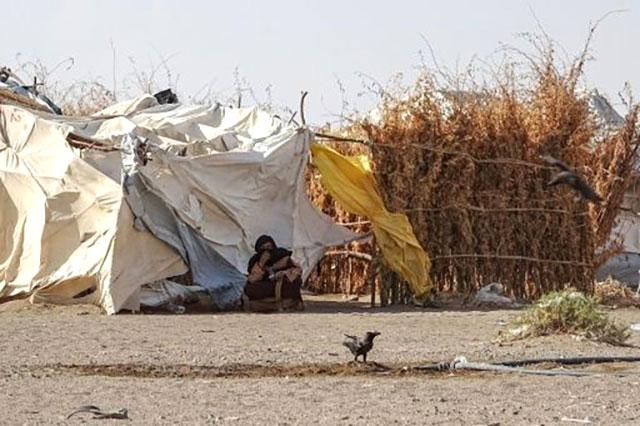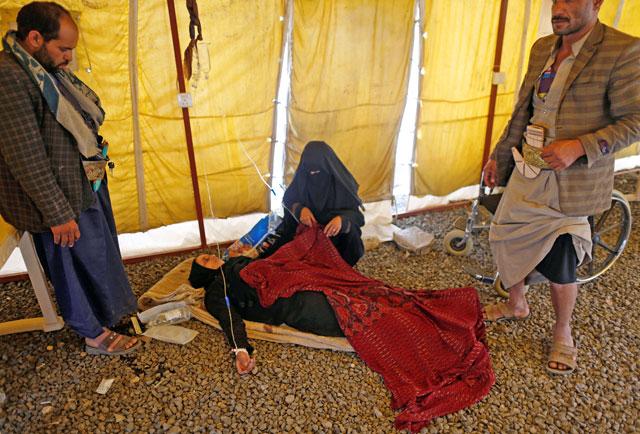You are here
Fear of virus grows in Yemen's squalid camps
By AFP - May 14,2020 - Last updated at May 14,2020

The Yemen conflict has pushed millions to the brink of famine (AFP photo)
ADEN — In a desolate camp for Yemenis displaced by war, Nasima Ahmed wonders how she and her four children can possibly protect themselves as the novel coronavirus stalks the country.
The five-year-old conflict between the government and the Iran-backed Huthi rebels has pushed millions to the brink of famine in a country ill-prepared to face the new health threat.
"We are not ready for the coronavirus because we have nothing," Ahmed told AFP at her tent, which is practically empty except for two ragged foam mattresses.
"We need to be able to store food in case a quarantine is imposed," she said. "I am afraid. I am scared for my children since this virus may lead to our deaths."
Squalid camps for internally displaced people like the one where Ahmed lives in Khokha, outside the Red Sea port city of Hodeida, are ideal breeding grounds for disease, with little chance of proper sanitation or social distancing.
Since the first COVID-19 cases were reported in Yemen last month, anxiety has grown among those living in tents -- fashioned from canvas, branches and scraps of plastic -- who are among the worst-off in the Arab world's poorest nation.
Yemen's health system has all but collapsed since the conflict broke out in 2014, with some 20 million people -- more than two thirds of the population -- needing aid to survive, according to the United Nations.
'No way to tell'
The government has so far reported 65 coronavirus cases, including 10 deaths.
The Houthi rebels, who control much of the north including the capital Sanaa, have announced two infections, including one death.
However, an official in the government's interim capital of Aden said the number of cases could be much higher.
"Seventy people died of various diseases in Aden in the 24 hours between Sunday and Monday," the official, who works in the government's crisis response unit, told AFP.
"It could be from the coronavirus... but in the absence of international organisations and testing, there is no way to tell," said the official, who asked to remain nameless.
The government has accused the Houthis of covering up cases, as Yemenis increasingly clamour for the two parties to set aside the conflict and focus on combatting the pandemic.
Around 3.3 million people have been displaced, forced to live in abandoned schools or camps where diseases such as cholera run rampant due to the scarcity of clean water and medication.
Aden resident Saddam Bijash complained he had not seen "any tangible measures" to curb the disease.
"We expect the virus to spread and for a disaster that no one will be able to control," he told AFP.
'Like wildfire'
Caroline Seguin from Doctors Without Borders (MSF) warned the coronavirus could spread "very quickly" in overcrowded cities and camps.
"People there often live with many family members in a small space, and camps mostly lack adequate hygiene measures, making it difficult for them to isolate themselves or to wash their hands," said Seguin, MSF's head of programmes in Yemen, Iraq and Jordan.
"Displaced people are also often poor, making it impossible for them just to stay at home while the virus is circulating -- they need to go out to earn or collect the basic necessities of life."
In Khokha, the authorities are trying to alert people about how to stem the spread of the virus, especially in camps like the one where Ahmed and her children live with around 600 other families.
"Many organisations are trying to raise awareness by using loudspeakers and going around in cars," Abdullah Dawbala, director of the health department in Khokha, told AFP.
Hodeida governor Hasan Taher said the authorities were trying to establish a health unit in each of the camps in the province, and for suspected cases to be taken to more advanced clinics.
As children played in the dust outside the rows of makeshift tents at the camp in Khokha, Salah Darwish, one of the displaced, said he was fearful for the young and the elderly.
"The virus will spread like wildfire -- we are afraid and anxious," he said.
Related Articles
HODEIDA, Yemen — A Houthi rebel advance near Yemen's lifeline port of Hodeida and a Saudi pullback have displaced more than 6,000 people, th
KHOKHA, Yemen — Mohammad Abkar thought he would be home by the time Ramadan rolled around, but the Yemeni father of three will spe
ADEN — Doctors Without Borders (MSF) has stopped admitting patients to its clinic in Yemen's second city Aden after staff were threaten


















